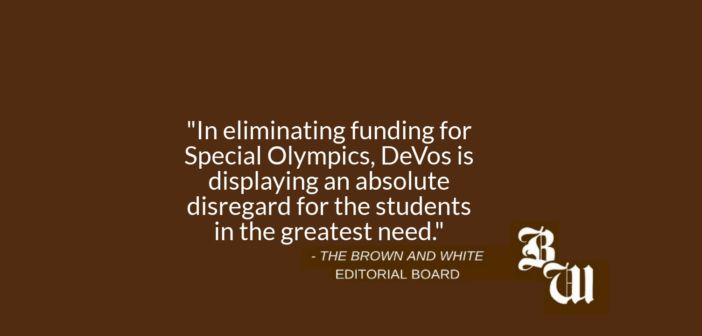News broke Tuesday that the Trump administration has signed to make significant budget cuts in its proposed Education Department budget for 2020, most prominently in the sector of special needs education.
At the forefront of these cuts is Education Secretary Betsy DeVos, who has gained a reputation among Democrats and Republicans alike for continuously placing her political agenda in front of the best interest of the children who are most greatly impacted by her decisions.
After a video surfaced of her being questioned by House Democrats accusing DeVos of specifically “going after disabled children,” an outpour of backlash came out in response.
Much of the backlash stemmed from DeVos defending the cuts,which mostly affected the Special Olympics, whose mission is ‘to provide year-round sports training and athletic competition in a variety of Olympic-type sports for children and adults with intellectual disabilities.”
The specifics of the budget cuts include $17.6 million to the Special Olympics and an overall cut to the education department by over 10 percent.
As a result of the public outrage, Trump has made many blanket statements ensuring that there will continue to be Special Olympics funding no matter what other budget cuts need to be made.
DeVos responded saying that this was her goal all along, insisting that she is happy that she and Trump see eye-to-eye on this issue.
While preventing the almost $18 million in budget cuts, arguably a small price to pay for the public backlash, on the Special Olympics is positive, no statements have been made on the rest of the budget cuts that have been, and continue to be made in the rest of the education department.
This would mean the third year in a row in which education’s budget has taken a severe hit, while simultaneously the budget for Trump’s border wall continues to bolster.
This justifiably results in further anger toward Trump, DeVos and the administration as a whole. Trump and DeVos were both extremely privy to this information, and based on the public response, both claimed to be surprised by the others’ reactions.
Separate from the display of the blaring disconnections that are existent in our current administration, this conflict calls out a much larger issue in the current American political atmosphere.
DeVos’ role, first and foremost, is to serve as the government spokeswoman on behalf of America’s children. Her role is to take the prominent needs in education, primarily public schools, and address them in a financially sound manner that sets each child up for success.
As government funding is primarily allocated to public schools, cuts in funding most immediately impact students whose families cannot afford private education. In the case of special needs students, this raises an entirely more pressing issue. The cost of raising a physically or mentally disabled child is expected to be quadruple that of a child without special needs.
In a public school system that has specialized opportunities for disabled children where families may already be facing severe economic hardships, these budget cuts may have the most extreme impact.
This cut presents a need for an education secretary that pushes for kids in need first. It is activities like the Special Olympics, that exist solely to promote the physical and emotional successes of disabled children and that prove the important and rare role that DeVos holds.
She possesses the power to enact changes that ensure the well-being of today’s children and enable them for future growth. In eliminating funding for Special Olympics, DeVos is displaying an absolute disregard for the students in the greatest need.
The importance of prioritizing the disabled is not a foreign concept to the Lehigh administration.
As an over 150-year-old institution, located on a steep mountain, Lehigh has made many efforts to improve campus amenities, ensuring that Lehigh is accessible for any person who wishes to attend.
Amidst a sea of campus improvements, Lehigh has implemented a new transportation program including AccessLU, “a means of getting around campus for mobility-challenged individuals.”
The program, which is supposed to launch by the end of the academic year, works to further the school’s goal of making Lehigh a place that is accessible for all and promotes the differences of every student, fostering a place for them to learn and grow, a lesson that our current political administration could significantly benefit to learn from.






Comment policy
Comments posted to The Brown and White website are reviewed by a moderator before being approved. Incendiary speech or harassing language, including comments targeted at individuals, may be deemed unacceptable and not published. Spam and other soliciting will also be declined.
The Brown and White also reserves the right to not publish entirely anonymous comments.
2 Comments
So once again, you guys have a very strong line in huffiness. And once again, I’m asking what you’re going to do about the problem. You’re in college, you’re about to leave and start making things happen in the world: what exactly are you going to go out there and do? I’m hearing zero plans for running for office, getting ground-level political experience and working your way up fast so that you can get into these offices and take control away from the DeVoses. I’m not hearing any serious political analysis, either — not hearing that you’re familiar with the machinery, or that you’re learning anything about it.
Are you maybe planning careers in writing tut-tutting editorials that the people being tutted at don’t read? And Matt, why are you letting this sort of thing pass as acceptable?
How much money has the Brown and White editorial board donated (or collected) to help that shortfall they feel so passionate about?
How about you guys do an editorial on how much tax payer money our educational system wastes on ESL classes? I think you’ll find plenty to support special needs kids.